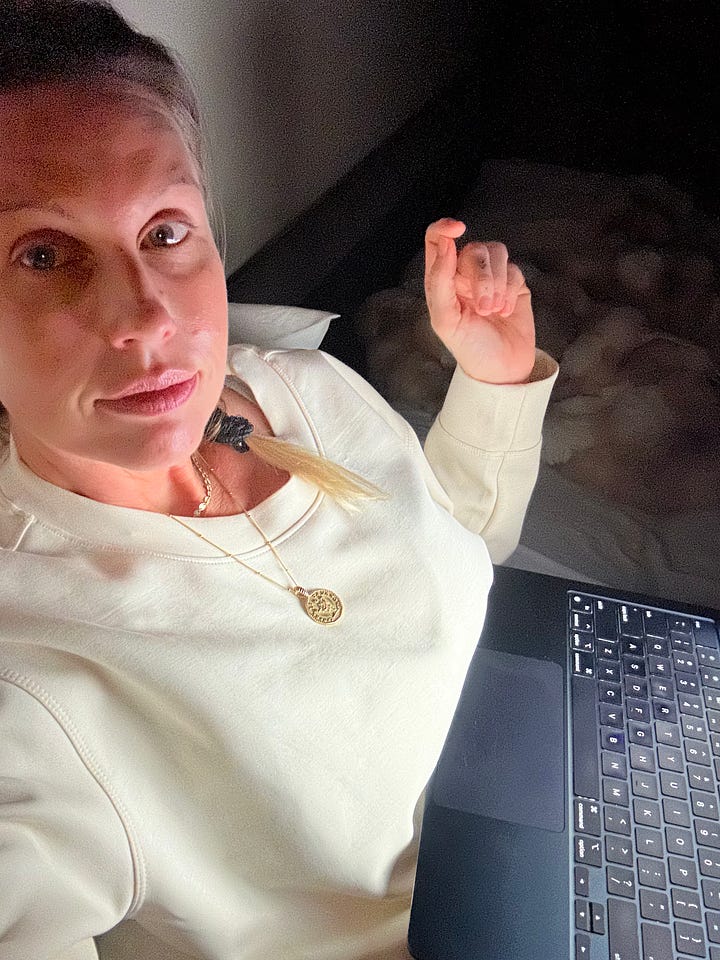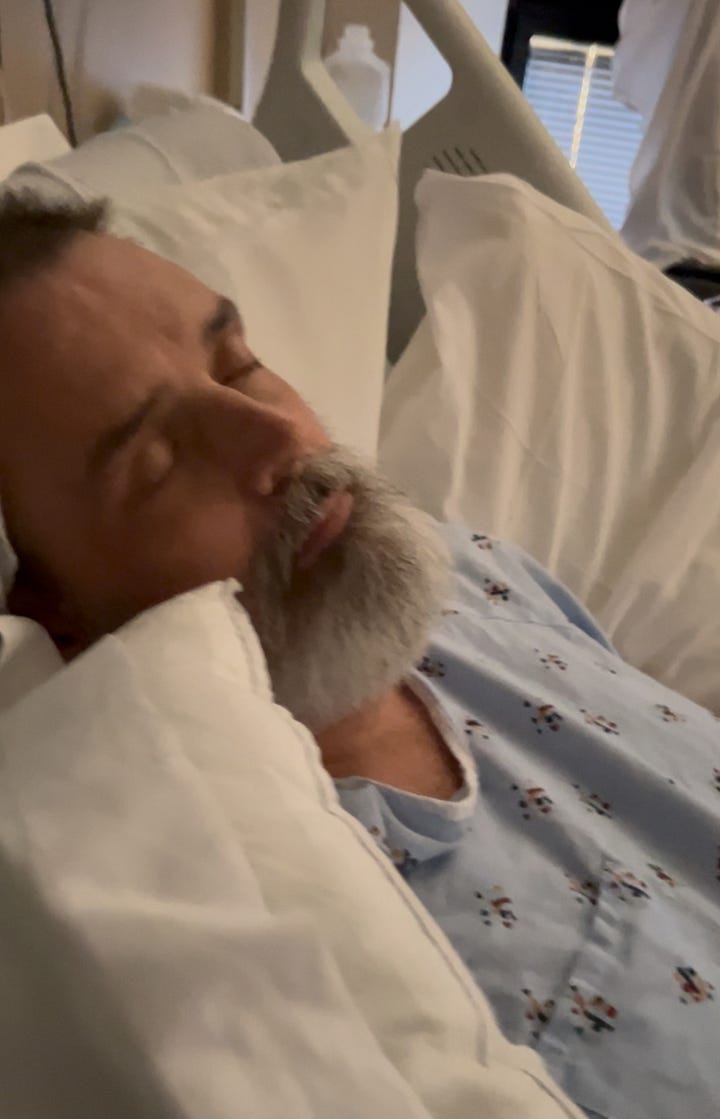The kids' graffiti sprawls across the bathroom floor. "I can't believe they don’t scrub it away."
Two small children huddle in the corner of the room—one dark-skinned with brown curls peeking out from beneath a baseball cap. Behind them, an elderly woman, likely their grandmother, watches over them from further away.
The walls are carelessly painted, the uneven coats failing to conceal the faded remnants of children’s games sketched on the wall—ghostly echoes of a room that once served a different purpose.
His eyes, which I once called "bedroom eyes," no longer meet mine with the same present connection. They drift past me, staring at specters I cannot see—visions of another reality.
Mid-sentence questioning is lost in the air as though in conversation with invisible beings—a response to internal stimuli, voices only he can hear.
Nothing is normal.
His body is no longer his own. Two 16-inch incisions carve down his abdomen, angular sliced flesh held together with meticulously placed staples, embedded in caked, dried blood with the goal of healing. Red burns of irregular shapes and size scatter the top of his chest. Dull, yellow blisters bloom—remnants of the eight-hour invasion of scalpels and hands intentionally cutting into fragile tissue, an effort to give my husband the best chance at life.

Moans of pain and torment seep from his lips. His body jolts, stiffens, trembles. His mouth gapes open, but words remain trapped inside—pain unmanaged, suffering unspoken. His eyes pleading with tears that never fall.
The clear thin tube from his nostril, spirals upward with brown bile into a bucket with a blue lid that dangles from the wall. The tube is hypnotic, a grotesque science experiment. The body, indifferent to nature’s intentions, is concerned only with it’s innate survival. It fills the void left by the missing organ with fluid. Infection has opportunity in this new place. A well known risk that layers my existing concerns.
Nothing is normal.
Machines chime in rhythmic intervals. A knock at the door mimics politeness, an illusion of permission. Strangers filter in and out. They all wear medical scrubs and most wear hair covers. Shift after shift brings different staff, their faces blur into fuzziness. I am grateful they write their names on the white board.

The same questions are asked, over and over: “How do you feel?” “What is your pain level?” “Did you do X, Y, Z?” There may be a lecture about not enough walking or my husband eating too many ice chips. Concerns about his choice to lay in the bed rather than sitting in the chair.
Nothing is normal.
I am dressed for a life that no longer fits. The scent of my 14-year-old daughter lingers on me—Bath and Body Works Pink Champagne. Chanel perfume clings to my skin. I smell like her. I smell like me. The familiar scents comfort me.
Starbucks Venti Blonde coffee drank two times per day, swirled with collagen powder and a protein shake. I feel so responsible with my diligence in packing protein. My attempt to be awake and not crash.

Two days of survival, sustained by handfuls of trail mix. Food feels too far away and I fear leaving him on his own. Ordering to the room isn’t an option since eating in front of another human who is forbidden to eat seems cruel.
Nothing is normal.
I remain vigilant at his bedside, attuned to every noise, every shift.
He calls my name. "Chelsea."
I jolt upright, my chest lurching forward from the gray plastic couch that is both a couch and a bed. My heart pounds, breath catching.
Is he okay? Did he vomit? Does he have a fever? Did he fall? Did he rip out one of the tangled tubes that tether him to life?
Nothing is normal.
Advocate. Explain. Quantify. Provide evidence. Listen. Probe. Reiterate. Build rapport. Pretend to agree. Walk away. Cry. Vent. Swear. Repeat.
Remind, remind, remind. Ask. Ask. Ask. I am the voice that he needs. Stay ahead of the pain. Please be on time. Did he take X, Y, Z? Can I get new sheets? The room needs cleaning. Can I speak with the nurse? When will the liver team do rounds?
Nothing is normal.
My body cycles through fight, flight, freeze, comply. Wired. Disoriented. Vision blurred by exhaustion. Deprived of sleep, I know no gentle awakenings.
Hand on my chest, one deep inhale— Instant slumber. A quick startle, and I’m physically up and moving once again. Rinse. Repeat.
Minutes bleed into hours, hours dissolve into days. The outside world fades. Day to day life is so very far away.
Everything is normal.
I take my nightly shower, erasing the remnants of the day. I slather on lotion.
Skincare routine. Brush. Floss.
Cozy sweatpants. Sweatshirt. Fuzzy socks. Furry blankets. All gifts sent from friends cocoon me.
Everything is normal.
I act as if. I must believe that I am still me. Because belief, even when false, creates the illusion of stability.
I engage in conversation that is his reality. This gives me the connection I so desperately need and reminds me of my days working in the psychiatric ward. His behavior scarring me. Amusing. Curious and so childlike that I am reminded of our now teenage kids when they had such little bodies and such big imaginations. There is a sweetness to what he sees.
I am not normal.
I steady my husband’s 6’4", 230-pound frame, maneuvering his silver cart filled with IV fluids, antibiotics, and machines that never cease their incessant beeping, assisting him to walk because walking is a goal and that goal is hard after such a massive surgery.

I make small talk with the nurse—words that mean nothing, because nothing matters in this chaotic, mess of uncertainty called recovery. The one step forward that is a few hours of relief countered with the whiplash of 3 steps back make my usual words with meaning, meaningless.
Body fluids no longer make me gag. I flick on my phone’s flashlight, meticulously inspecting each piece of cut flesh. I know what infection looks like. I no longer turn my head away because this is my new normal.
I am no longer normal.
I know more medical terminology than I ever wanted to comprehend. The statistics. The science. I am well versed in rectal cancer that has spread to the liver. I understand the nuances of a disease that could steal years of life with the man I love.
I will never unsee what my eyes have been pried open to see even when I yearn to squeeze them tightly shut. The ripples of human suffering from illness surround me. The loved ones waiting, supporting, walking alongside the crashing waves that took over their lives, a brutal tide of suffering.

My normal is gone.
I yearn for the past versions of hardship—the fear, the sickness, the entrapment that once felt unbearable but now seems like mercy. I once begged for this surgery. We prayed for it. Now I long for the days before our new version of difficulty, when the hard felt impossible but was still manageable.
But I know better now.
Unwanted knowledge. Unwelcome wisdom.
This is my normal. A women who loves a man and is fiercely determined for the direction to change.
A women who presses lettered computer keys, an attempt to spell out the words embedded in her heart and capture the images in her mind, untangling the complexities in hopes of making sense of this life of being human.






Love you